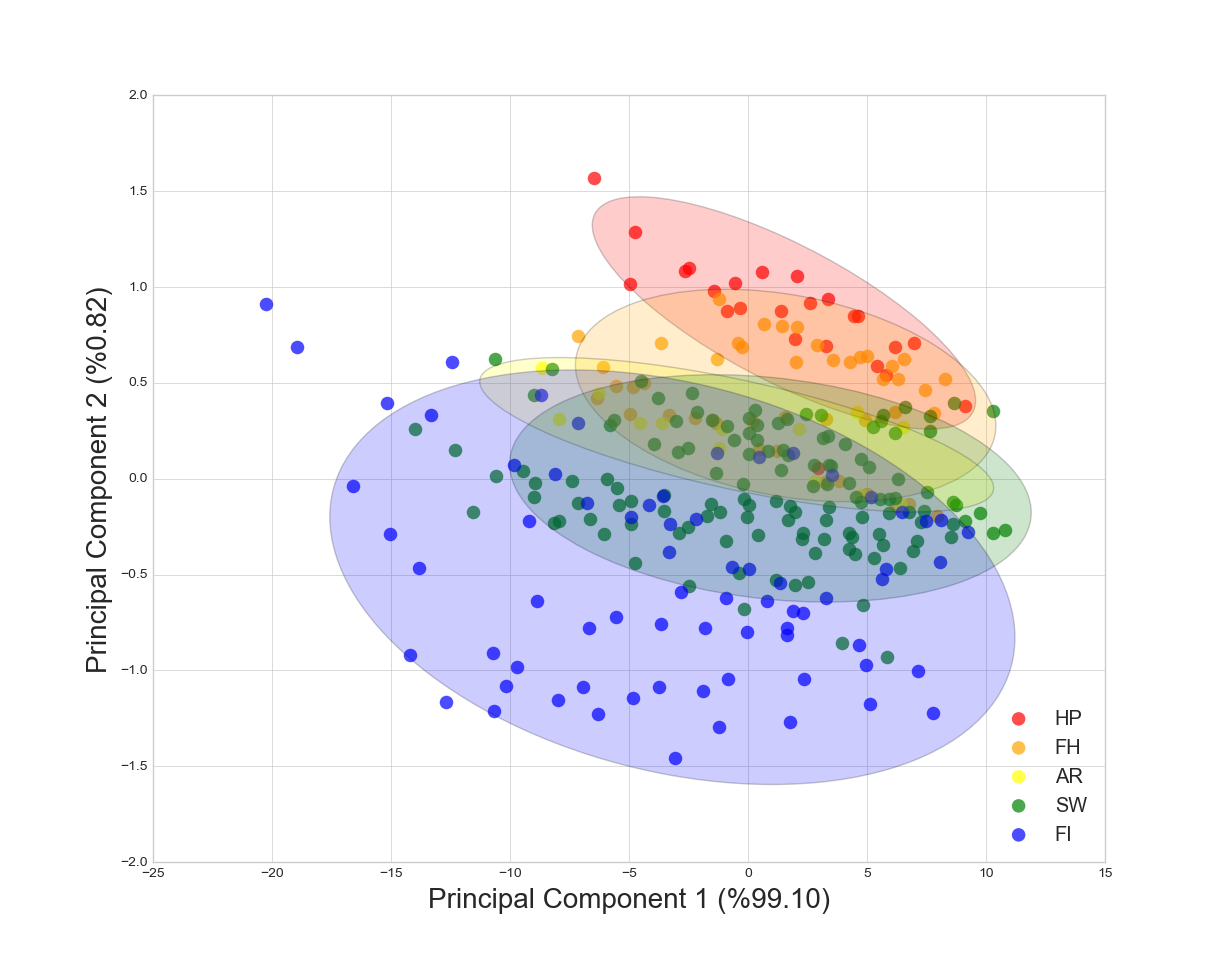Scatterplot ellipse
Date: April 7th 2016
Last updated: April 7th 2016
This entry borrows a little from analysis/analysis/principle components analysis (PCA). However, the end result is the same if you use a pandas DataFrame containing x and y data.
Useful references
- http://stackoverflow.com/questions/20126061/creating-a-confidence-ellipses-in-a-sccatterplot-using-matplotlib
- http://matplotlib.org/examples/pylab_examples/ellipse_demo.html
from matplotlib import pyplot as plt
import numpy as np
import math
from matplotlib.patches import Ellipse
from sklearn.decomposition import PCA as sklearnPCA
# create two PCA components
sklearn_pca = sklearnPCA(n_components=2)
Y_sklearn = sklearn_pca.fit_transform(x)
# Additional processing of PCA
print(sklearn_pca.components_) #array [ncomponents, nfeatures]
print(sklearn_pca.explained_variance_) #var explained by each component
print(sklearn_pca.explained_variance_ratio_) #percentage explained by each component
def eigsorted(cov):
vals, vecs = np.linalg.eigh(cov)
order = vals.argsort()[::-1]
return vals[order], vecs[:,order]
with plt.style.context('seaborn-whitegrid'):
# only one plot
fig, ax = plt.subplots(figsize=(6, 4))
for lab, col in zip(('HP', 'FH', 'AR', 'SW', 'FI'),
('red', 'orange', 'yellow', 'green','blue')):
# The following two lines subset the data based on the factor "lab" above
# y==lab returns an array of true or false, and the number specifies the
# column to return from the dataset (here the dataset is Y_sklearn)
# The output for xdata and ydata is a vector of length that matches 'lab = true'
xdata = Y_sklearn[y==lab, 0]
ydata = Y_sklearn[y==lab, 1]
# get values to build the ellipse
cov = np.cov(xdata, ydata)
vals, vecs = eigsorted(cov)
theta = np.degrees(np.arctan2(*vecs[:,0][::-1]))
w, h = 2 * 2 * np.sqrt(vals)
# create the ellipse
ell = Ellipse(xy=(np.mean(xdata), np.mean(ydata)),
width=w, height=h,
angle=theta, color='black', alpha=0.2)
ell.set_facecolor(col) # reference the colour for each factor (defined by lab)
ax.add_artist(ell)
ax.scatter(xdata, ydata,
label=lab, # use labels provided above
c=col, # use colors provided above
lw = 0, #remove the outer line of each point
alpha=0.7, # increase transparency of points
s=95) # increase the size of points
# add labels showing percentage of the variance explained
ax.set_xlabel('Principal Component 1 (%{:.2f})'.format(sklearn_pca.explained_variance_ratio_[0]*100), fontsize=20)
ax.set_ylabel('Principal Component 2 (%{:.2f})'.format(sklearn_pca.explained_variance_ratio_[1]*100), fontsize=20)
plt.legend(loc='lower right')
plt.show()
Output
